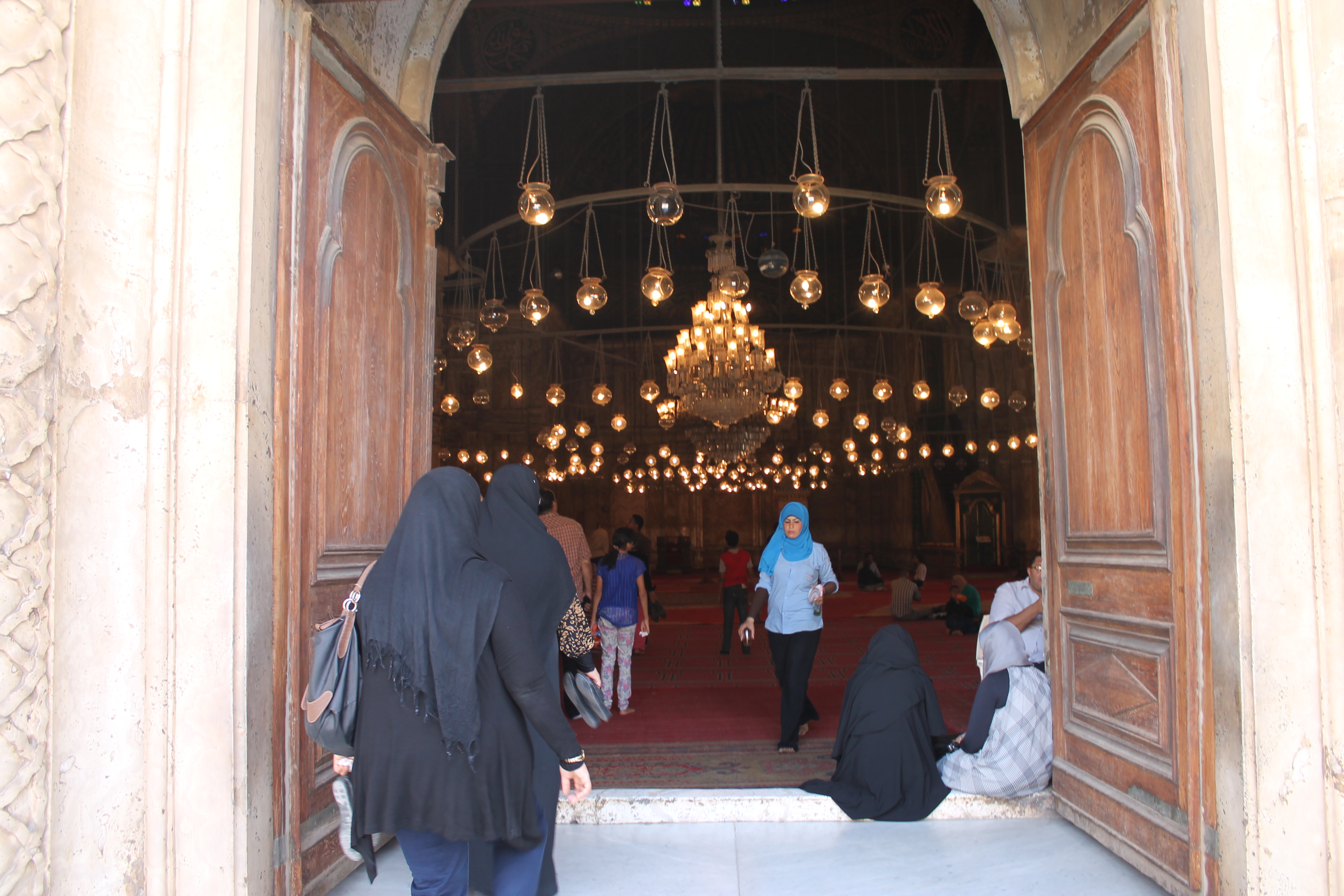A Contradiction in Terms? Islamic Feminism and Reopening “Bab al-Ijtihad”
HOW DO WE TALK ABOUT WOMEN IN EGYPT?
By: Deena Sabry
Follow @deenasabry
By the end of the 10th century, Sunni jurists “closed the gate of ijtihad” and said new interpretations of Islamic law and conduct were no longer needed.
For the next 1,000 years, Muslim societies have had to accept these interpretations, some of which have fallen to scrutiny as sexist, misogynistic and degrading of the status of contemporary women.
Saudi Arabian Sheikh Saad Al Hajri, for example, used such interpretations to justify saying that “a woman’s mind is quarter that of a man.”
Pakistani Preacher Junaid Jamshed said “Allah doesn’t like it when a woman’s name is mentioned in the Quran.”
Other sheikhs have debated whether a woman’s voice is awrah (vulgar and should not be loud) or a fitnah, that can incite men to wrongdoing. But that was not always the way Muslim women were treated.
In early Muslim history, women were equal to men, with a myriad of them holding positions that would, in the contemporary time, be deemed as ‘male’ positions.
They were military commanders, businesswomen, investors and doctors — essentially at a higher status than most women today. Islamic feminists are digging into this period to challenge current governance.
“Giving the prerogative to interpret anything to anyone and just constraining it to a certain time is wrong, and in itself wrong within the Sharia perspective, because religion is supposed to be something that is applicable for all times. Something that is, in some instances, intentionally left on a very wide scope and interpretations are left open,” said Nora Salem, assistant professor of political science.
“The idea behind that is to apply it for eternity. Saying the interpretation should be limited to some restricted people and restricted times is, within itself, not logical.”
However, the issue is not solely about interpretation. Because hadiths (sayings of Prophet Muhammed) were compiled in the eighth and ninth century, generations after the Prophet’s death, some researchers say that some of these may have been passed down incorrectly.
One popular hadith states that people should be pessimistic about three things: a donkey, a woman and a house.
“Upon hearing this, Aisha [the Prophet’s wife] got really angry because that’s not what the Prophet said. What he actually said, according to Aisha, is that this is what people used to say about women prior to Islam, which is what Muslims should refrain from saying,” said Asmaa Othman, a lecturer at Tanaghom Center and a graduate of the Higher Institute of Islamic Studies and the Preachers Preparations Institute, in a lecture about women’s rights in Islam on November 30.
“It [the hadith] became part of our understanding of the religion even though these are the myths the religion eradicates … If we attributed any bad thing to a woman or donkey or a house we will never advance.”
WOMEN IN THE PAST: ISLAM VS. COLONIALISM
“During the Prophet’s time, women enjoyed many freedoms in aspects they’re shut out from today, such as participating in war. Women’s opinions were also valued and influenced the executive decisions of even the most powerful men, such as [former Caliph and friend of the Prophet] Omar Ibn Al Khattab,” said Hanan El Bahie, journalist and author of Al Abaya (The Cloak), a book that discusses Egyptian politicization of the abaya.
“Omar was in a mosque where he gave an opinion on how a divorced couple should settle their finances. A woman disagreed with his opinion publicly and after hearing her out, he agreed with her opinion and retracted his. He then said ‘The woman is right and Omar is wrong’.”
Western colonization, however, played a major role in weakening the status of women, restricting their rights and facilitating gender inequality.
Under colonization, women’s rights and duties became stricter, heavily contributing to sexism and the prevalence of gender inequality.
FEMINISM VIS-A-VIS NATIONALISM
Following independence from colonialism, women’s issues rose to the surface, and in the case of Egypt, Islamic feminism came to life vis-a-vis nationalism.
“Women were allowed to participate in the 1919 Revolution because there were movements of national liberation. Egyptians went through the battle of liberation, achieving independence and the Nasser experience, which embraced a view about the position of women where it witnessed a higher participation of women within the political arena,” said Omneya El Naggar, adjunct professor of political science.
“All of these experiences led to the reopening of the discourse of religion, especially after [the defeat of the Arabs in the 1967 War] Al-Naksa.”
“Under this, there was a new wave of people who would look critically inside Islam to see if Islam is inherently oppressive of women and their rights.”
This fold includes Huda Sha’arawi, one of the most prominent Egyptian feminists who founded the secular Egyptian Feminist Union in 1923 and wrote about how women were oppressed under the patriarchal nature of society rather than Islam.
“I decided to attack the problem of backwardness of Egyptian women, demonstrating it arose from the persistence of certain social customs, but not from Islam, as many Europeans believe,” wrote Sha’arawi in Harem Years: The Memoirs of an Egyptian Feminist (1879-1924).
Like any form of feminism, the basic premise of Islamic feminism is to advocate for equality between the sexes, however, it focuses on achieving that equality within a religious framework as it upholds the belief that authentic Islamic values have historically maintained a high status for women.
“The role of Islamic feminists should be raising awareness on the importance of women studying religious texts rather than blindly following a sheikh‘s interpretation and mainstream preachers,” said El Bahie.
The question of who interprets religious texts, and therefore proscribes rulings, has been a longstanding debate within Islamic circles.
“When interpreting the Quran and Sunnah, you have to see it from the peculiarity of the time and the context. Generally and broadly speaking there is a variety of rights within Islam for women. Does the religion provide for women’s rights? Yes. The bottom and utmost expression of the rights is the philosophical, moral and spiritual interpretation of what a woman is in Islam in the verse that talks about the idea of the equality of el nafs (the soul) … [In religion, men and women are] equal in terms of duties, obligations, consequences and rewards,” El Naggar added.
LAW AND THE PRINCIPLES OF ISLAMIC SHARIA: THE CASE OF EGYPT
Article 2 of the Egyptian Constitution states that Islamic Sharia is “the principle source of legislation.” In practice, however, only Personal Status Law abides by Sharia.
“Personal Status Law before 2000, before the last amendment, was not acknowledging the khula, the right for a woman to get divorced based on unilateral desires without the consent of her husband,” said Salem.
In fact, Sharia Law provides more women’s rights than Egypt’s national law, and if there are discrepancies, these should be addressed, Salem added.
One area of discrepancy involves women’s inheritance rights. It is widely practiced, that a man inherits double what a female would, as stated in the Quran: “The male receives the equivalent of the share of two females,” (Sūrat an-Nisā, verse 11), however, that is only one case among many.
“If we go back to the religion, that’s not what it’s supposed to be. When it comes to inheritance, there are 36 cases where the woman inherits more than the man. In real life, the man takes everything. Is it Islam or is it social habits, customs and norms? We need to ask this question and review it,” said El Naggar.
Muhammed Imam, Islamic thinker and member of Al-Azhar’s Academy of Islamic Research, contested that widespread belief on ART Al Awael in 2009, where he explained that inheritance is not based on one’s gender, but their relationship to the deceased.
“There are two standards when it comes to inheritance: the closer an individual is to the deceased, the more they inherent. The second standard has to do with age, the younger the individual is, the more they inherent because they are likely to live longer,” said Imam on TV.
“The only case where a man receives the equivalent of the shares of two women is when he is closer to the deceased and is younger in age.”
Another issue of contestation is polygamy, as the Quran gives a Muslim man the right to four wives. While this right is granted, there are conditions tied to it, like the principal of fairness, which entails that a man is required to equally provide for all four wives, emotionally and materially. However, polygamy is usually practiced within the society without any restrictions.
“There is a need to revisit [polygamy]. There are several fuqha’s (jurists) interpretations of polygamy on whether it is justified and based on what conditions. In practice, it does not happen this way. There are different interpretations on whether this is a clear major license given to men. It is a very restrictive license and you need to advocate for that … You have miss practices of Islamic laws in the society,” said El Naggar.
EGYPT’S PENAL CODE: A MISOGYNISTIC CRIMINAL JUSTICE SYSTEM
Unlike Personal Status Law, the Egyptian Penal Code does not abide by Islamic principles. It is often criticized for several articles pertaining to women that put them at a disadvantage when compared to men.
Articles 17 and 60 are loopholes that are commonly used to exonerate men from certain punishments. The former states that a judge has the right to reduce a defendant’s sentence, while the latter states that the provisions of the Code do not apply to deeds committed “in good faith, pursuant to a right determined by the virtue of Sharia.”
Both articles have previously been used to exonerate criminals, like in 1998 when a psychologically ill girl’s father and brother killed her out of fear that she may get involved in promiscuous activities.
Although the court found no proof of the girl’s chastity being in question, the judge gave just the father 10 years of hard labor for first degree murder, a crime, according to Article 230, normally punished by death penalty.
When it comes to criminal prosecution under Sharia Law, punishments are more extreme and, in some cases, range from lashes to capital punishment.
However, it is based on really tight and restricted conditions that are not always easy to meet. The punishment for non-marital sex, for instance, requires confessions or testimonies by four Muslim male eyewitnesses.
In addition, men and women are subjected to the same criminal punishments under Sharia Law.
“Adultery, according to Sharia law, is gender-equal; the same punishment is administered to both genders. Whereas in the Egyptian Criminal Code, Article 277 says that men who commit adultery get a six months prison sentence, whereas in Article 274, women get a two-year prison sentence. For the same exact offense we have different criminal sanctions and that is a deviation from Sharia Law that disadvantages women,” said Salem.
WHERE DO EGYPTIAN WOMEN GO FROM HERE?
Feminism, Islamic or secular, is highly controversial and often heavily criticized for having numerous ideologies and subgroups that are, in some cases, quite radical. However, in essence it is an ideology that advocates for the rights of women, regardless of the manner by which each subgroup chooses to seek those rights.
In the case of Egypt, the question remains — a society with a strong religious foundation that is largely opposed to secularism, could Islamic feminism help Egyptian women?
“If you look into the history of women’s rights, you will find that the recurring element is that men will not give women their rights. Women have to fight for it,” said Salem.
“If they [women] don’t claim that position of interpretation then they leave that entire re-interpretation to men … It’s important that we break this open and not be silenced by [those who say] it’s haram (forbidden) for women to interpret the religion.”




